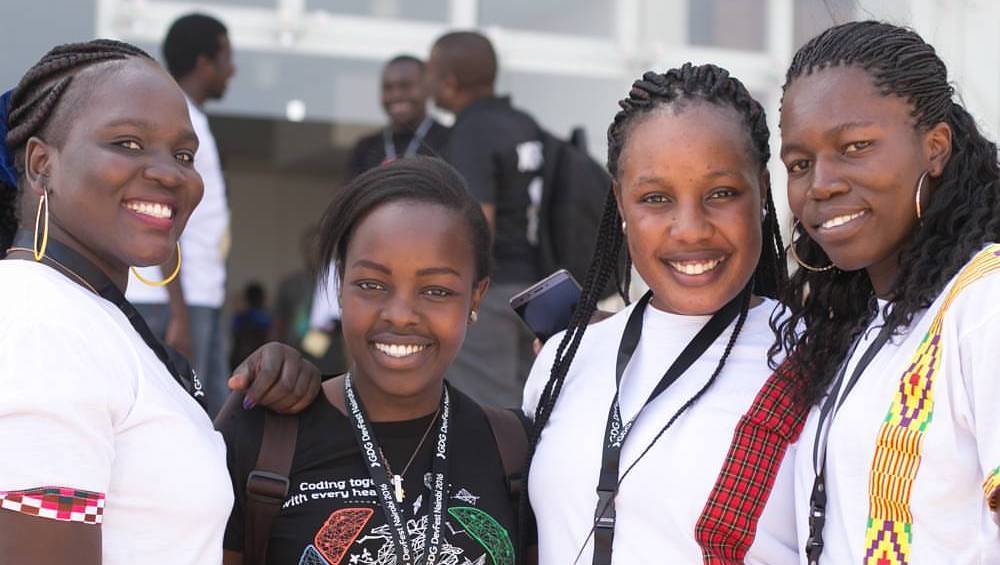March 2017
GDG Strathmore is based at Strathmore University campus. That means the chapter lead leaves once they have graduated. This is exciting as new leads bring different perspectives that enrich the chapter's activities. But it’s also challenging to find good leaders that can build on previous experience and relate to the community's needs and expectations. Roina Ochieng is the current and first female GDG Strathmore lead. She shared her insights on how she is preparing to hand over the chapter's leadership, and how they have succeeded to engage and include more women in their community.

Roina, how did you get involved with GDG Strathmore?
I enrolled at Strathmore University because I was interested in Informatics and Computer Science. It seemed like a good idea to join GDG Strathmore to learn even more about it.
We only had 2 female members back in 2013. There was a bit of apprehension towards having a femaIe co-lead. We started to have regular Java and Android meetups, which was very easy with all the Udacity courses content. This helped me get established as a lead. We managed to look at the learning as a joint effort with me being a facilitator rather than a trainer. I was good at organizing events and learned the rest from our previous chapter lead.
There are also many more chapters around Nairobi now, and our members base grew to over 1,000 registered members. There are approximately 256 regular meetup attendees and almost half of them are women. About 15% of regular attendees are professionals or techies from outside our GDG. We benefit from positive feedback and WOM that helps attract them and our community.
What is your personal motivation behind the community work that you do?
Before I joined GDG Strathmore, I really didn't realize how big of an impact a community can have. I assumed that I would have to learn everything and overcome every challenge by myself.
From the very first meetup I became very passionate about things larger than myself. Just by having a simple conversation or feedback you get such a change of perspective.
I also honestly believe that you need to translate general knowledge to the specific context or issues your community faces. I continue to be amazed by the ripple effect our meetups have on people from all over the country.
That sounds really interesting. How did you manage to attract more girls to your community?
Oh, girls were always interested but since it used to be so male dominated, they were wondering if it was for them as well. We started to have separate meetups for girls in different time schedules. You know, guys don't mind staying late at night. But it’s a security risk for girls and they might also have families to take care of.
How did you decide about the content of the meetups?
We started at the very beginners level and with UI/UX based on a survey we did among interested people. This came as a surprise, because we were mostly focused on topics like Android. So we actually had to partner with local experts, and we were able to find a female speaker. That was the right move to inspire the participants.
Men didn't want to be left out, so we opened the meetups to them as well. But just having them marketed as meetups for women created a totally different dynamics, and the girls were more confident.
How do you manage your chapter operations and ensure that the transition to the new chapter lead is as smooth as possible?
There is always a lead and a co-lead that is scouted to take over the chapter leadership once the lead graduates. This creates an “I teach you everything I know” relationship. We implemented this after I painfully learned that there are many things I was not aware of when I took over – things like how to report the chapter's data, where to look for things like content bundles curated by the Google Developers team, etc.
What achievements are you most proud of?
The first Android fundamentals course was great. Out of 50 people that started, 30 of them finished. Three of them created a start-up. We were using this weather app for classes and they thought, “How do we best put it to use?”
They decided to go to the drought-affected Turkana region to look for opportunities. They were able to create a low bandwidth app that could connect various NGOs in the region. After they successfully applied for a grant, they equipped local representatives with smartphones to record data and send out emergency messages if needed. Amazing how far they got from classroom assignments to helping hundreds of people!
Our DevFest 2016 was pretty awesome as well. We had 210 participants from all over the country and every single GDG in Kenya was represented. To meet in person, share, and learn from each other was so inspiring.
What do you think you are best at?
We have really cool outdoor events. Besides sharing knowledge, eating is a big part of them :) But kidding aside, we realize that office jobs make us physically unfit and we usually have some outdoor activities. Like our popular game, Lake of Fire. Everyone gets a sheet of paper and joins a team. The whole team needs to get from point A to point B just by stepping on the paper they have. So their resources are limited, which is almost always the case in real life. This usually results in situations like people carrying other people that were complete strangers a minute ago. Some are even doing handstands, laughing, and just having a great time.
Wow, your meetups really sound like a lot of fun. Do you face any challenges at all?
I feel like we have a shortage of good venues – we usually have to convert a space to fit our expectations. We try to create really cool spaces outside and be eco-friendly at the same time. So, for example, instead of buying plastic chairs we get haystacks from local farmers to sit on. This is sustainable and gives people something to talk about :)
What in the near future are you looking forward to the most?
Members in our chapter are very hungry for new content, and also very vocal about any bugs they encounter :) I'm excited to see our activities grow, and to see the new lead taking over.
I'm also hoping to see students who are not tech majors getting involved more. From a recent survey we did, only 40 out of 130 respondents were tech majors. We see that Financial Economics students are especially interested to implement a lot more tech content into their studies.

